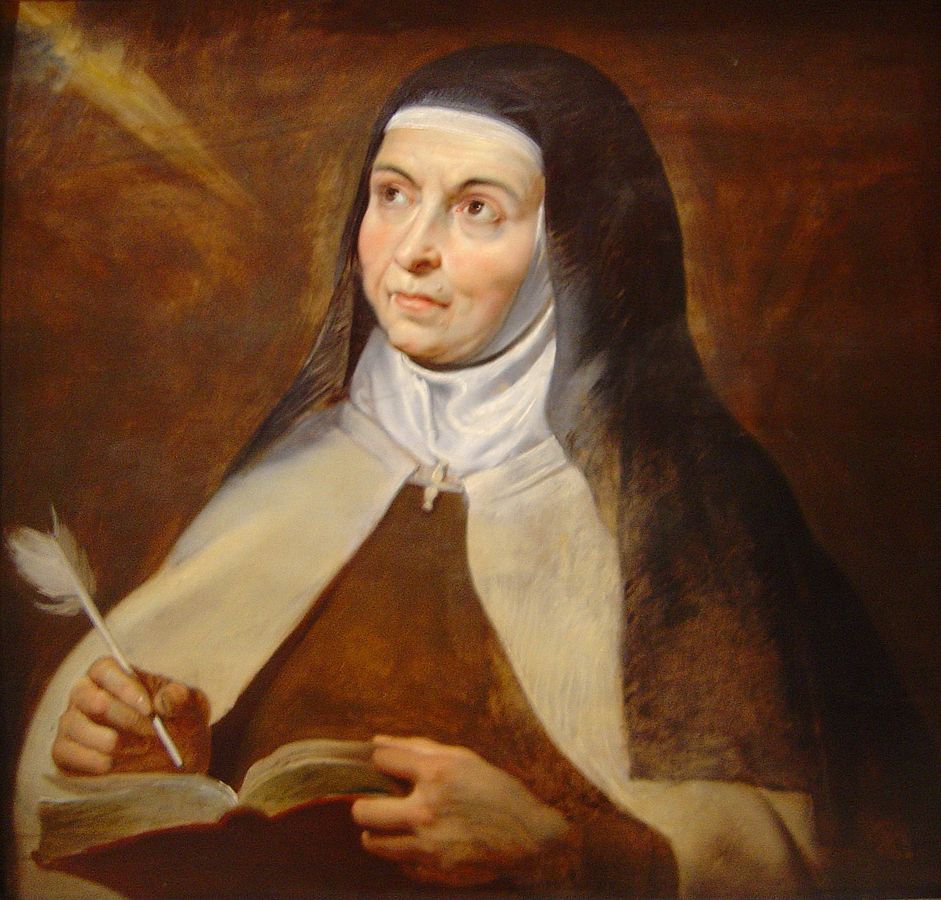
One of the reasons why the Protestant Reformation had made such headway was that many members of Catholic religious orders had been setting bad example rather than good example. So Catholic reformers now had to jack up, first of all, the ideals and practice of men and women religious. Teresa began by establishing a stricter life in her own Carmelite monastery in Avila. After that, she set up, all in all, about a dozen convents in which poverty was really poverty and prayer was really prayer. No half-measures. She also established two reformed monasteries of Carmelite men, and then let the Spanish Carmelite mystic, St. John of the Cross, take over the men’s reform from there. This more austere branch of the Carmelites, men and women alike, was called the “Discalced Carmelites” because the members wore open sandals rather than shoes.
A brief sketch of St. Teresa of Avila like the above can only hint at her greatness, for great she was. She was so great as a spiritual writer that in 1970 Pope Paul VI proclaimed her a “doctor of the Church” - the first woman ever given that title. She was a great reformer. What she did for the Carmelites had much wider repercussions. It set an example for other religious orders, and the spiritual revival of all these orders quickly percolated down to the Catholic faithful whom they served, and to the Church in general. She was a great person.
Do you picture her as a languishing neurotic? She was anything but! Teresa was plump, pleasant, forthright and had a delightful common sense of humor. A few stories will illustrate. One night when Teresa was sleeping in the same room as another nun, the nun said, “I was just wondering. If I should die now, what would you do alone with a corpse?” Teresa, though a bit startled, answered, “I will think about that when it happens, sister. Now, let’s go to sleep.” When she was about to found a monastery at Toledo she discovered she had no cash but five ducats. Somebody asked how she could open a convent with such small funds. “Teresa and five ducats are nothing”, she replied; “but God, Teresa and five ducats, that’s everything!” In accepting candidates for her order, she looked for intelligence first, piety second, she said; but “God preserve us from stupid nuns!” These three are true stories. Perhaps the last one is just a legend, but it is still typical. One day, they say, Teresa was riding a donkey from one of her convents to another. When they came to a big mud-puddle, the sassy donkey balked and threw the saint right into the muck. St. Teresa, always in touch with God, said, “Lord, why this?” He answered, “That is the way I treat my friends.” Teresa came back, “Then no wonder You have so few!” St. Teresa, help us not to take ourselves too seriously. --Father Robert F. McNamara
Scripture. Rom 8:22-27
and to find that, in order to speak to its eternal Father and to take its delight in him, it has no need to go to heaven or to speak in a loud voice?
However quietly we speak, God is so near that we will be heard. We need no wings to go in search of God, but have only to find a place where we can be alone and look upon God present within us. Nor need we feel strange in the presence of so kind a guest. We must talk to God humbly. We should speak with our Father, and ask for whatever we would ask of a father or mother. (Way of Perfection)
Musical Selection
Merciful God,
who by our Spirit raised up your servant Teresa of Avila
to reveal to your Church the way of perfection:
grant that her teaching
may awaken in us a longing for holiness,
until we attain to the perfect union of love
in Jesus Christ our Son our Lord,
who lives and reigns with you,
in the unity of the Holy Spirit,
one God, now and for ever. Amen. (English Missal)